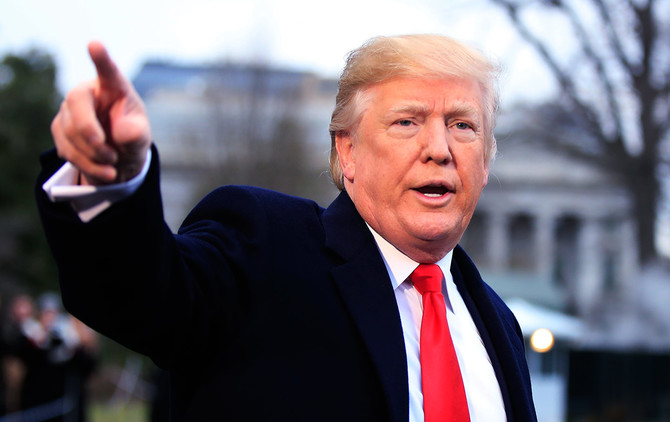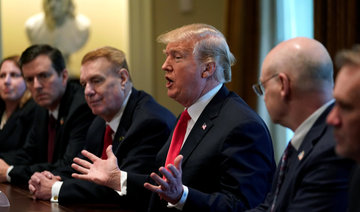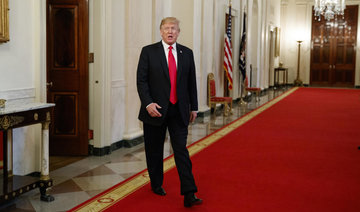WASHINGTON DC: US President Donald Trump yesterday welcomed the prospect of a trade war with other countries, remaining defiant in the face of the global uproar sparked by his sudden announcement of steel and aluminum tariffs.
With global stock markets tumbling and allies indignant, the president responded to the negative reaction by raising the stakes and vowing even more sweeping trade steps.
In a blistering series of morning tweets, he said he would impose “reciprocal taxes” on all imports from trading partners that have duties on American exports.
Such a move would expand the administration’s confrontational “America First” trade policy far beyond the hefty steel and aluminum tariffs he announced on Thursday — which come despite strenuous objections from stunned advisers and powerful industry groups.
The wide-ranging actions, if imposed, would eviscerate the rules-based global trading system and drastically raise the chances of a trade war.
But in an early morning tweet Trump seemed to welcome the prospect, saying trade wars were “good and easy to win.”
“Example, when we are down $100 billion with a certain country and they get cute, don’t trade anymore-we win big. It’s easy!”
Allowing imports into the US market duty free when similar exports face tariffs is “not fair or smart,” Trump said on Twitter.
“We will soon be starting RECIPROCAL TAXES so that we will charge the same thing as they charge us. $800 Billion Trade Deficit-have no choice!“
He also defended his decision on Thursday to impose 25 percent tariffs on steel imports and 10 percent on aluminum.
“IF YOU DON’T HAVE STEEL, YOU DON’T HAVE A COUNTRY!” Trump said in another tweet on Friday.
Wall Street losses continued to mount on Friday’s opening, with all major global indices also in the red.
Senior officials were caught flat-footed by Trump’s announcement on Thursday, which comes at a period of low morale and turmoil for the embattled White House, which has suffered stinging reversals and high profile departures in recent days.
And economists say tariffs such as those Trump proposes will hurt the US companies and workers he has said he wants to protect. As the world’s largest steel importer, the move risks jacking up costs for crucial inputs for infrastructure and industries that are major employers.
An editorial in the conservative Wall Street Journal typified the dismay of industry advocates, calling the tariffs the “biggest policy blunder” of Trump’s young presidency and “self-inflicted folly.”
Trump’s most persistent trade adversary, China, on Friday called on the US to exercise “restraint,” warning that the US offensive could prompt reprisals and have “a serious impact” on the global trade order.
The European Commission vowed to “react firmly” while Canada and Germany each called the tariffs “unacceptable,” with Germany urging Trump to reconsider.
David Kotok, chief investor at the asset manager Cumberland Advisers, said Trump’s action endangered any economic benefits from December’s sweeping tax cuts and the current cycle of rising benchmark interest rates at the Federal Reserve.
“He is losing his staff. He is isolated and beleaguered,” Kotok said in a client briefing note.
“And in the midst of crisis he tosses an ill-thought-out bomb called protectionism that punches out the best of our allies and friends while it strengthens our nation’s adversaries.”
Trump’s decision — which leans on a rarely-used trade provision allowing protections for national security — could hit other countries far more than China, which is the world’s largest steel producer but accounts for less than 1 percent of US imports.
Major players in the US metals industry and their workers, who have long complained of dumping, overcapacity and subsidies by competing producers, would be the obvious beneficiaries.
But analysts say a far larger share of US industry and economic activity would be exposed to higher prices, weighing on growth and employment.
Recent official figures show about 140,000 Americans work in US steel mills, generating about $36 billion in economic activity, or about 0.2 percent of GDP.
But steel-consuming industries employ 6.5 million Americans and add about $1 trillion to GDP.
In 2002, then-President George W. Bush imposed steel tariffs that caused an estimated 200,000 in job losses and cost nearly $4 billion in lost wages. The administration backtracked a year later after it lost a dispute before the World Trade Organization.
According to NERA Economic Consulting, a 7 percent duty on aluminum alone would cost the manufacturing sector 3,040 jobs and $1.4 billion a year, while the economy overall would lose $5 billion and 22,600 jobs.
And analysts said the main fear is what happens as the situation escalates once other countries begin to react.
“We think overall, the danger is contagion — the reaction — rather than the actual tariffs themselves,” Fat Prophets resources analyst David Lennox told AFP.
Defiant Trump welcomes ‘easy to win’ trade war
Defiant Trump welcomes ‘easy to win’ trade war

Saudi consumer inflation eases to 1.8% in January: GASTAT

RIYADH: Saudi Arabia’s inflation softened to 1.8 percent in January, signaling contained price pressures even as housing rents remained the main driver of consumer costs, official data showed.
According to the General Authority for Statistics, average prices for housing, water, electricity, gas and other fuels rose 4.2 percent in January, reflecting a 5.2 percent increase in actual residential rents.
Saudi Arabia’s inflation trajectory broadly aligns with projections by the International Monetary Fund, which said in October the Kingdom is expected to maintain an annual inflation rate of about 2 percent in 2026.
In its latest report, GASTAT stated: “The Consumer Price Index in Saudi Arabia recorded an annual increase of 1.8 percent in January 2026, compared to the same month of the previous year.”
It added: “This increase was mainly driven by a rise in housing, water, electricity, gas, and other fuel prices by 4.2 percent, transport prices by 1.5 percent and restaurant and accommodation services prices by 1 percent.”
According to the report, expenses for personal care, social protection and miscellaneous goods and services increased 7.9 percent year on year in January, while insurance and financial services costs rose 3.3 percent.
Prices for recreation, sport and culture increased 2.3 percent, driven by a 3.7 percent rise in package holiday expenses. Education service prices rose 1.6 percent, reflecting higher secondary education costs.
Food and beverage prices increased 0.2 percent year on year.
Conversely, prices for furnishings, household equipment and routine household maintenance fell 0.3 percent in January, while healthcare expenses declined 0.1 percent over the same period.
On a month-on-month basis, Saudi Arabia’s CPI rose 0.2 percent in January from December.
Housing, water, electricity, gas and other fuels increased 0.5 percent month on month, again driven by higher residential rents. Transport prices rose 0.2 percent, while restaurant and accommodation services gained 1 percent.
Food and beverage prices fell 0.6 percent during the month, and information and communication costs slipped 0.1 percent. Education, healthcare, furnishings and tobacco prices were largely unchanged.
Wholesale Price Index
In a separate report, GASTAT said Saudi Arabia’s Wholesale Price Index rose 2.9 percent in January compared with the same month in 2025.
The increase was attributed to higher prices for other transportable goods — excluding metal products, machinery and equipment — which climbed 4.9 percent, as well as agricultural and fishery products, which rose 4.2 percent.
Metal products, machinery and equipment prices increased 1.2 percent year on year in January, while food products, beverages, tobacco and textiles rose 0.3 percent. Ores and mineral prices declined 0.1 percent.
Compared with December, the Kingdom’s WPI increased 1.5 percent, driven by a 3.4 percent rise in other transportable goods excluding metal products, machinery and equipment.
On a month-on-month basis, agricultural and fishery product prices increased 0.5 percent, while food products, beverages, tobacco and textiles posted a modest 0.2 percent gain.
Average prices
In another report, GASTAT highlighted notable changes in average prices of goods and services across Saudi Arabia in January.
Local watermelon recorded the largest month-on-month increase at 7.5 percent, followed by local black eggplants at 6.5 percent, local okra at 6.3 percent and Indian pomegranates at 6.1 percent.
Conversely, several items posted sharp price declines.
Abu Sorra Egyptian oranges recorded the steepest fall at 28.2 percent, followed by Pakistani mandarins at 21.3 percent and green beans at 12.3 percent.













